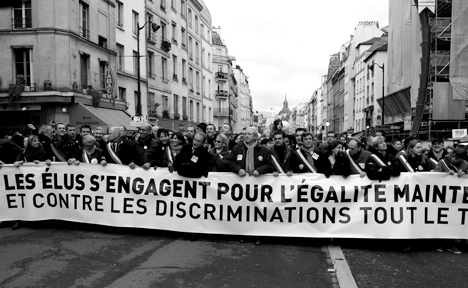Aro Velmet: According to one facile, yet seductive reading of the current crisis in Europe, the source of controversy in Europe – on issues ranging from gay rights to the refugee situation – lies in the resurgence of an atavistic nationalism. This is seen to be the case particularly in eastern Europe, but also in western Europe in the form of parties such as UKIP, Front National and Pegida. This reading contrasts resurgent nationalism with the idea of a political community based on universal rights, where national, ethnic or religious identities are intentionally set aside in public life. The European Union very often draws on the language of universal human rights, to give one example of how such a community is forged. The prime example is, of course, France and its Republican tradition – summed up most commonly in the maxim liberté, égalité, fraternité.
Your work intervenes compellingly in this debate by taking a critical stance towards Republican universalism, and by showing the ways in which tensions within Republicanism itself have led to unequal treatment and discrimination. You’ve looked at the ways Republican arguments were used by the Right in debates on PACS (Pacte civile de solidarité, gender-neutral cohabitation) and on gay marriage, but also more recently, in how universalist arguments have troublingly shaped debates over race after the Charlie Hebdo shootings. What are your findings from your analysis of these events?
Camille Robcis: Since the 1980s Republicanism has become an important way to talk about French political culture. To be sure, Republicanism has a long history, it did not emerge in the 1980s and historically, it never meant just one thing – there was a Republicanism of 1789, 1792, 1848, 1870, 1905, 1945. In any case, since the 1980s, Republicanism has functioned as a tool for differentiating French political culture from two other forms of politics: liberalism and totalitarianism.
Within these debates around race and sexuality, liberalism – also described as the “Anglo-Saxon model” – is associated with individual rights, capitalism and multiculturalism. These are of course stereotypes, but the idea is that this mostly American vision of the social and the political leads to atomization and anomie: the state recognizes everyone’s particular little privacies at the expense of the public – literally of the res publica. On the other hand you have totalitarianism, which throughout the 1980s was embodied by communism and the Soviet Union, but with the fall of the Berlin wall, the concept tends to designate radical Islam. In this case, there is too much homogenization, not enough difference, a state that oppresses individuals for the sake of the public “whole”. Within this paradigm, Republicanism stands as a kind of middle ground between liberalism and totalitarianism with the right amount of freedom, the right amount of coercion and a society that it ultimately imagined to be cohesive, centralized and unified.
AV: What is it about the 1980s that forces this language of – historically left-wing – Republicanism to the fore? It seems that when it comes to the Right wanting to deny rights to groups such as Muslims or gays, the old language of heteronormative nationalism seems to work for them. It certainly worked for Jean-Marie Le Pen. So what changes in the 1980s?
CR: I think it has to do with the progressive waning of the two principal “utopias” (to use Samuel Moyn’s term) of the postwar world: communism and internationalism. Republicanism came to fill that void. The 1980s is also a time in which we can observe a great amount of anxiety about the role of France in the world, with the growing visibility of immigrant populations demanding new rights, with the expansion of the European Union, and the accelerating pace of globalization.
I think the emergence – or rather the re-emergence – of republicanism in the 1980s is also a reaction against the pensée 68, the language of difference that was invoked by thinkers such as Derrida, Foucault, Deleuze and Guattari, but also French feminists like Monique Wittig for example. If you think about it, the “right to be different” can go in two ways: it can go in the direction of organizations such as SOS-Racisme, who adopt the republican model and say, “look, we are not different, we are just like you, the real problem is racism and we must be anti-racist”, or it can also go in the other direction, in the direction of identity politics, you can say, “universalism is not working, we have to come up with something else.”
That’s really what happened in the 1990s and particularly in the 2000s with groups like “les indigenes de la republique”, “les indivisibles”, etc. These activists and intellectuals argued that anti-racism has failed France because all it was doing was assimilating them into the majority, pretending that difference did not exist, and not dealing with how this difference was produced by that very universalism in the first place. These groups argued that the problem was not so much racism but race per se: race as a legacy of France’s colonial history. Their point was that you could not think about immigration without thinking about empire. But empire remains a very difficult question in France.
AV: The history of empire and Republican universalism itself is tied together, too. It’s not arbitrary groups that are described as incapable of becoming a part of the res publica. It’s always very specific groups …
CR: … gays, women, Jews…
AV: Women, Jews, Muslims. So what’s the historical context for understanding that?
CR: I think there is a long term and a short term explanation. The long term one has to do with this question of abstract universalism, which is basically a legacy of the French Revolution. Part of the revolutionary project and what makes French political culture quite unique, is this idea that the nation is composed of individuals who are able to abstract their private interests in order to participate in the common good. So unlike the American model where legislature exists to mediate amongst competing interests, the idea here is that differences would be neutralized in the public realm. Abstract universalism was also the condition of equality in the sense that the law is supposed to treat everyone as an abstract entity.
The famous example here is the Jews during the French Revolution. France was one of the first countries to emancipate Jews but as Clermont-Tonnerre famously put it, the Revolution was to give Jews everything as citizens and nothing as a nation. What this means is that if you abstract your Jewishness and assimilate into the French Republic, you will be treated equally, like any other citizen. But the problem is that the content of the abstraction keeps on coming back. Historically, this was obvious during the Dreyfus affair, during Vichy, and it is still obvious today since anti-Semitism has certainly not disappeared from the French social landscape. When in 2012 three Jewish children and their teachers were killed in a school, they were not targeted as “abstract French citizens” but as Jews.
So abstract universalism has been a historical problem, but also a theoretical one. Marx articulates it especially eloquently in his essay “On the Jewish question“. In this text, Marx famously attacks Bruno Bauer (as a representative of the Young Hegelians and of idealism more generally) for championing the French Revolution and its model of “political emancipation” with all its values: human rights, universalism, formal equality, secularism. According to Marx, the process of abstraction required by “political emancipation” does not eliminate prejudice and more dangerously, the state becomes the “devious intermediary” that assigns you your identity. Abstraction, in other words, cannot do away with the social, the material.
Abstract universalism has been tested many times in French history. Joan Scott, for example, has written extensively about the challenge that women posed for abstract universalism. As she shows, it was very hard for women to demand the right the vote, because they were always seen as too concrete, too embodied, too womany. This is why it took so long for women to get the vote in France (1945) because they had “only paradoxes to offer”, to borrow Scott’s expression.
Since the 1980s, many of those groups that have fallen through the “historical cracks” of abstract universalism have risen to the surface, many inspired by the international context. This was especially visible in the case of gay rights: EU law was changing, US law was changing, creating a series of legal issues for French nationals. You cannot have a European Union where some countries allow people to get married and others do not while promising freedom of movement. Eventually, same-sex couples began going to other countries to get married, to have children, to adopt, to find surrogates and when they tried to get the French state to recognize their marriages or their children, the inconsistencies of French domestic partnership law (the PACS) became obvious.
AV: The question of gay marriage is very interesting, because in this debate, the language of universal rights has been used in France to oppose gay marriage. In some ways, this is very unique to France, but it also reminds me of the debate in Estonia, in that it evades the standard battle lines of secularism vs Christianity that characterize this debate in, say, the United States. You’ve shown that arguments about Republicanism were seized upon by anti-gay marriage groups. What were these arguments and where did they come from?
CR: The gay marriage movement began in France with the call for civil unions in the late 1980s and throughout the 1990s, culminating with the PACS in 1999. The discussions that preceded the PACS were really interesting and the law did not have to take the shape it eventually did. One of the initial proposals for example, suggested that civil unions could be signed between two friends or two siblings – basically anyone you wanted to join yourself to. Some people thought that this was a way to “hide” the question of homosexuality, but the more radical and more interesting reading of these first proposals was that it could really explode the notion of kinship and with it, the understanding of the social: “let’s rethink the social not around the sexual couple, but around real units of choice, families we choose”.
AV: So that didn’t work.
CR: [laughs] Nope. What was interesting was that gay activists at the time knew that if they asked for the PACS in terms of “gay rights”, it would not go anywhere, because they would be seen as too communitarian, too specific, too individualist, not French enough. So they asked for domestic partnerships in the language of Republicanism, saying that what they wanted was to make the universal (sexual coupledom) truly universal. By excluding gay people, they argued, the status quo was not actually universal. And this tactic worked.
The opponents of the PACS were sort of taken aback by this strategy – they couldn’t say that the PACS was not Republican, because it clearly was. So this is where they turned to these really difficult notions of structuralist anthropology and psychoanalysis, such as the Symbolic and argued that same-sex couples could never be “symbolic” because the symbolic was anchored in sexual difference. As one of my favourite article titles of the time put it (this was from a particularly reactionary psychoanalyst, Jean-Pierre Winter), same-sex families would produce “symbolically modified children”. The Symbolic here was another way to try to impose transcendental norms, to resist history and limit democracy.
Eventually the PACS was passed but it left out two extremely important clauses: nationality and filiation. This meant that a foreign national who was PACSed with a French citizen could not acquire French nationality, whereas with marriage, this would be automatic. Moreover, the PACS gave no parenting rights so (heterosexual) married couples could have access to reproductive technologies and to adoption whereas (homosexual) PACSed couples could not.

Mariage pour tous! [Marriage for all!], 16 December 2012. Photo: Philippe Agnifili. Source:Flickr
This is how we got to gay marriage in 2013. Hollande did eventually take on the fight and he defended the law using the language of universalism: the law was called “Mariage pour tous” – marriage for all, as opposed to gay marriage, which was very smart given the importance of universalism. Christiane Taubira, who I think is a political genius, defended the law beautifully by saying that
mariage pour tous was taking Republicanism to its logical conclusion, that the existing situation was actually communitarianism. So she reversed the terms by arguing that gay marriage was not only compatible with Republican values but that it was its expression.
AV: The communitarian here referring to the heterosexual community.
CR: Precisely. This flipped around the situation of the 1980s when people were saying that the gays were being communitarian by demanding specific rights “for their community”. Taubira also emphasized that children in same-sex families already existed and that they were “the children of France” – in other words, not foreign, not anti-republican.

La Manif pour tous, Paris, 21 April 2013. Photo: Serge klk. Source:Flickr
The Right had to react to this, and they could not use religious arguments, because like in Estonia, as you say, these do not carry much weight. So instead the Right turned once again to republicanism. The Manif pour tous, the main group opposing the marriage law, dressed up as Mariannes, the symbol of the French Republic, and they invoked Delacroix’s painting, Liberté guidant le peuple, May ’68, the Resistance, and all these various symbols of French history to try to reclaim the Republic and heterosexualize it.
The way I read this situation was really as a sort of contest, a struggle for the Republic: on the one hand, those like Taubira who argued that the universalism of the Republic could and should include homosexuals; and on the other hand, those like the “Manif pour tous” who insisted that the universalism of the Republic was heterosexual at its root and therefore that homosexuality needed to be excluded from the national framework.
AV: When I hear the way you describe the use of republican arguments on the Right, I wonder to what extent these moves were framed by any actual understanding of Republicanism, and the degree to which Republicanism became just an empty signifier?
CR: That’s the really hard question, because you are right: so often it does seem like these groups are using Republicanism (and French history!) as an empty signifier. There is no such things as an authentic, original or coherent Republicanism. After all, many historians of France have spent a great amount of time showing us how Republicanism as a practice was never as homogenous as its theorists wanted it to be. But I think you cannot simply dismiss this return of Republicanism as an empty signifier because it is important and significant that this was the symbol and the language that both camps (the Left and the Right) turned to. It shows us, with particular clarity, what the real stakes of gay marriage were: a fight for the definition of the nation.
AV: The thing that is interesting about the French case is that Republicanism is not supposed to be “French”. It’s supposed to be abstractable with reference to everyone who lives in a given political community, setting it apart from communities based on ethnic nationalism. Yet the limits of this concept on the Left, however, have become really apparent over the past year, during which the Socialist government has had to deal with the Charlie Hebdo events, and later the November terrorist attacks as well.
CR: There is a lot to say about the Charlie Hebdo events but one of the things that I found really interesting was the absence of any discussion of race in France in this context. Part of the problem in France is that there is a lot of discomfort with using the term “race”, since people have a biologistic understanding of the term, which is obviously not how people in the US employ this term – here it is used as a tool to talk about structures of power.
AV: At least by those people who do not vote for Donald Trump.
CR: Exactly, at the least by the self-declared Left. Being “color blind” in the US is the position of the Right, not the Left. In France, however, there is still a lot of resistance to this and a fear that if you name race, you will somehow undermine the principles of abstract universalism and equality. So one thing that struck me was the obsession on the part of many French commentators with defending Charlie Hebdo as somehow representative of laicité and the values of the Republic, instead of asking why these images – given the context in which we live today – might be perceived as offensive. This question seems to me unanswerable without an understanding of race. So, no, it is not the same thing to make fun of Catholics, Jews and Muslims, given the fundamental power differential among these three groups. Charlie Hebdo regularly depicted Muslims as Osama-bin-Laden-types, fundamentalist fanatics, sexually depraved rapists – thus mobilizing a series of very old orientalist clichés concerning the Arab world. This was never innocent: not in the past, not today.
In any case, in parallel to these conversations regarding the content of Charlie Hebdo, the press and many French political leaders were treating the perpetrators as foreign: when had they travelled to Yemen? Had they travelled to Syria? Where were they radicalized? Which foreign imam did they listen to? But in the case of these three men, you really don’t need to go outside: just explore where they were born, where they grew up, where they went to school and where some of them went to prison. This is not a way to excuse them but to try to understand how this horrible event could have happened. There has been a lot of really important work in the social sciences that deplores the state of prisons, schools, housing in France and that basically shows how these are deeply-rooted structural, systemic problems. It is not a question of a few “rotten apples” but of historically produced, long-standing discriminations. More and more, the failures of this Republican model of integration are becoming apparent. France is not unique here, and the United States has certainly not resolved the problem of discrimination, to put it mildly, but at least there is a consciousness that the “black” in “black lives matter” is important – whereas in France, you can barely say the word “black” without being accused of anti-Republicanism.
AV: And yet France was a republican empire, for much of its history.
CR: A republican empire. And if you adopt this framework of thought, then everything shifts. Race is no longer something you can erase, an aberration or an addendum, it is actually constitutive just as empire was constitutive of the Republic.
I think we’re at a crossroads now, both academically and politically, between people who think that we need more universalism, a better, more expansive form of universalism, that we need to find more ways to integrate people into the republican model, and other people who say, let’s look at this historically, let’s take this republican empire to use your term, and try to think about real pro-active remedies to these centuries of discrimination. Something like reparations, something like affirmative action, serious changes in the school curriculum, in higher education, in policing practices – mechanisms that many in the United States have been thinking about at least since the Civil Rights movement. I think it has become very clear for the American Left that you cannot erase hundreds of years of slavery by simply saying “okay let’s stop discrimination and let’s all be really equal now”. It does not work that way.
AV: As you said, there is a structural problem here with universalism, where the idea of abstract political rights makes it impossible to talk about particular communities having specific problems, because the idea of universalism creates this sense that any discussion of particular identities reifies these obstacles to Republicanism; but also erases the inevitably historical roots of universalist ideas themselves.
This reminds me of another universalism, which Samuel Moyn has written a lot about, the idea of universal human rights, which many in Europe have seized upon in the ongoing refugee crisis. And now it appears as if there are limits to what a discourse of human rights can do as well, as people are starting to say that there is something fundamental about Islam that makes Muslims unable to respect these abstract norms. Here, too, the Christian history of supposedly universal and ahistorical human rights is rearing its head.
CR: Yes, I think that’s right. I have been thinking about Moyn’s work a lot, especially his most recent book Christian Human Rights. Moyn argues that human rights, as we understand them today, emerged in the 1940s in reaction to liberalism and totalitarianism. One question that I have been wrestling with (and that Moyn’s book has helped me think about) is whether, despite the obvious decline of Christianity all over Europe (in terms of church attendance for example), Christianity is in fact perhaps quite alive and vibrant but as law, culture, as politics. And this form of transcendence is very hard to give up. There is still a lot of work to be done to bring to light these genealogies, to understand them, and to not take any of these terms at face-value, transcendentally whether it be Republicanism, secularism or human rights.
AV: So what’s the alternative? Isn’t every kind of political community going to be based on a kind of abstraction almost by definition?
CR: That’s a really good – and a really hard – question. I think it’s also an impasse for a lot of critical thinking today. I don’t know. Can we imagine a community based on something more concrete, something more material or embedded, on “lifeworlds”? And would these be less mediated than abstract universalism? It’s very hard to know. To some extent, this is what Marx tried to do in “On the Jewish question”, where his alternative to “political emancipation”, liberalism, abstraction, is called “human emancipation”, whatever that is! But I have no idea how you achieve that.
The other option would be to think about politics in more pragmatic terms, and not be so obsessed with universals. In France, after the first “veil debate” in 1989, the government decided to let each individual school decide whether girls wearing veils were “disturbing” the public order or not. There was a minimal number of expulsions, but then the 2004 law dramatized this situation way out of proportion. So instead of imposing a general law, as the French, loving universalism, did, perhaps we should consider these things on a case by case basis. Again, there are problems with this approach too: in the United States for example, the case-by-case decisions often end up relaying really crucial political questions to the Supreme Court when they really should be decided and discussed by a legislature (which would presumably be a more democratic solution!). Or else, the market takes over, so instead of coming up with a law that would regulate ethically-complicated questions like surrogacy for example, you let the market decide. This form of “pragmatism” leaves many questions unsolved. So I don’t know … Perhaps what we need to do, in order to answer your question, is think harder about what “human emancipation” might look like! [laughs]








